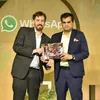Google Launchpad Accelerator is looking to accelerate the growth of women entrepreneurs in India
Paul Ravindranath G, Program Manager at Google India talks about the company’s Launchpad for Women Entrepreneurs, and supporting them through mentorship, and creating a pool of women tech entrepreneurs.
The Indian tech industry employs 10 million people of which women make up for just 34 percent of the total number of employees. The higher you go in the organisational structure, the lesser the percentage of women, reveals Google’s Women Techmakers India Research Report.
“While women hold 40 percent of entry-level tech jobs, they hold 30 percent of mid-level positions and only 20 percent of senior-level roles,” states the report.
According to the report, in the context of tech entrepreneurship, women comprise a mere 10 percent.
While the numbers aren’t surprising, the challenge remains as to how to change this equation, especially when the level playing field is uneven for women tech entrepreneurs, or generally for women in tech. The question also arises as to how to create an environment where the percentage of women, whether in tech or entrepreneurship continues to grow.
At Google India, Paul Ravindranath G has been working to change these numbers, especially of women in tech.
Paul is the Programme Manager at Google India and has spent over a decade at Google working on various teams ranging from Google Search and Webspam to Emerging Markets and Developer Relations. He currently drives Google's Launchpad Programme and oversees Google's Women Techmakers Programme.

Paul Ravindranath G, Programme Manager, Google India
In a long chat with HerStory during the Launchpad for Women Entrepreneurs event, a two-day programme focused on women entrepreneurs, Paul reveals how Google India is trying to ensure that women have the best support in the form of mentorship, throws light on important industry trends and the challenges that hold women entrepreneurs back.
Focusing on women entrepreneurs
Launchpad Accelerator was started in 2018 in Bengaluru. What started as a one-week bootcamp has now evolved into structured accelerator formats all over the world. Launchpad Accelerator was started in 2016 in San Francisco and was open to 15 countries including Indian startups and 30 Indian startups graduated from the global accelerator between 2016 to 2018. Launchpad Accelerator in India focuses on seed-stage to growth-stage startups who are solving India specific challenges using AI/ML.
Out of the 1,000 plus applications they receive 20 startups are selected every year who receive mentorship support from Google in AI/ML, UX, cloud, marketing, and product strategy.
Over the years, the one thing that has stood out for Paul has been the lack of women applicants.
“When we started, we hardly had any applications from women. With the evolution of the ecosystem and some of the efforts we have made with targeted outreach, we now have more women applying,” he says.
The accelerator now receives 20-25 percent of applications from women. Paul adds, “This is personally a huge win because this has been a constant challenge. One can never compromise on the final set of folks who make it to an accelerator programme. But we must do everything we can to flood the base with enough applicant pool.”
The Launchpad for Women Entrepreneurs, which they started three years ago, has helped increase their engagement with women entrepreneurs and also support them through mentorship. This year they had 200 applications out of which 11 startups were selected. They do one cohort every year and have been doing so for the last three years.
They are not ready, yet
There is always this question surrounding why women don’t apply to accelerators. Is it because they are not confident enough? Paul says,
It's mostly because they believe they are not ready yet. Or they don't fit the criteria, or they kind of over-engineer the selection criteria and they self-select themselves out of applying. Alternatively, most of the male entrepreneurs have a different approach of, “hey let me try".
He adds, “I'm not a big supporter of women-only focused events or activities or programmes. But the fact remains that the level of comfort, camaraderie and the sense of community that they feel at such events actually seeds a broader mainstream inclusion of women entrepreneurs into broader programmes. And therefore, I would definitely continue doing a lot of these women-focussed women entrepreneur focus Launchpad boot camps”
In the cohort of 11 startups this year in the Launchpad for women, Paul reveals, “at least three of the founders I spoke to were like “I don't know, should I be here.”
It is also the reason they have invested in a stage agnostic programme. “We have a mix of women entrepreneurs who have a prototype to women who are on the cusp of raising Pre-Series A.” What bonds them, points out Paul, are their struggles, challenges and stories that help to inspire each other and push them to apply to different programmes despite the fear of rejection."
Different challenges
One of the key asks for most women entrepreneurs who have applied or been a part of the cohort has been the lack of tech expertise. Some of the asks of the applicants have been - tech strategy, scalable tech strategy and more.
Paul explains, “There are a lot of women who seek to apply for mentorship who run small and medium business, or they have a brilliant idea, but the tech enabler component is missing. There are a few women who kind of straddle the line. But it still continues to be a challenge for them to find a tech co-founder, for example, or invest in a CTO, because they don't know and understand it strongly enough. And it holds them back or slows them down before they finally bite the bullet and say, go with a tech agency or hire one or two people if they believe a customised solution is needed for the solution for the startup.”
However, when it comes to understanding users Paul believes women founding teams have a lot more empathy. However, the best case is to have diverse teams, especially core teams.

Launchpad Women Entrepreneur
The EQ edge
Paul says, “Data shows that 65 percent of startups fail because of leadership issues and this anonymous feedback we collect is always an eye-opener for leaders because they have huge blind spots.”
As part of the Launchpad, Google organises a leaders lab, which is 360-degree feedback for founders, gathered anonymously from co-founders, employees, and investors.
When it comes to women leaders, Paul feels that their sense of empathy and higher emotional quotient are invaluable.
Women are seen as being more empathetic, they tend to pull together a different kind of emotion from the teams, which has led to bonding people and rally them better. Most more often than not, it actually helps teams to be more diverse, better focused, they gel well together.
Creating a larger pool of women in tech
Paul is also contemplating on a more homogenous stage-wise programme for entrepreneurs when it comes to talks or workshops for early-stage, or mid-stage startups. He wants to add more value and ensure “more and more women can benefit from mentorship-based programmes, and get connected with Google's ecosystem so not only does it give them support but also boosts their visibility and confidence.”

Launchpad Women Entrepreneurs cohort
More importantly, he is working to create a larger pool of women tech entrepreneurs. “The tech women entrepreneurs are typically people already in the tech sector,” he points out. Based on their learnings from the Google’s Women Techmakers India Research Report, Paul says, “there is a leaky pipeline, and not enough women in senior leadership but more importantly, the more interesting fact is that only 17 percent of women who work in tech companies actually invest in any kind of upscaling or are curious to learn about some new tech, or know about communities that are there to support and nurture them.”
What makes the rest of the pack unaware or shy away from upscaling are challenges like lack of engagement, family responsibilities which clash with meetups or workshops timings, etc. This is a problem that Paul and his team are trying to address as well.
“We are actually trying to cross-pollinate organisations, and create employee resource group connections. We are trying to do more of the grassroots level kind of engagement based on the data we have and our understanding of the ecosystem. A lot of the women entrepreneurs actually come from there. So I think investing in future entrepreneurs, by beginning to nurture the tech women in the tech ecosystem is a start,” he added.
While on this journey, Paul also believes it is all about organising a self-sustaining movement where women founders and entrepreneurs who benefit also give back.
“Launchpad is an ecosystem building programme and the mentor ecosystem is what drives it. But mentors are actually born out of alumni and founders and others. What the Launchpad is doing is providing a free and open safe space where women entrepreneurs don't feel judged but learn from peers and others.”
In the next few months, he wants to see more women founders transition into larger mainstream programmes. “I can already see solid potential and many of them are in different programmes. I definitely want to invest more in women mentors, to contribute to all our activities,” he adds.
(Edited by Rekha Balakrishnan)









